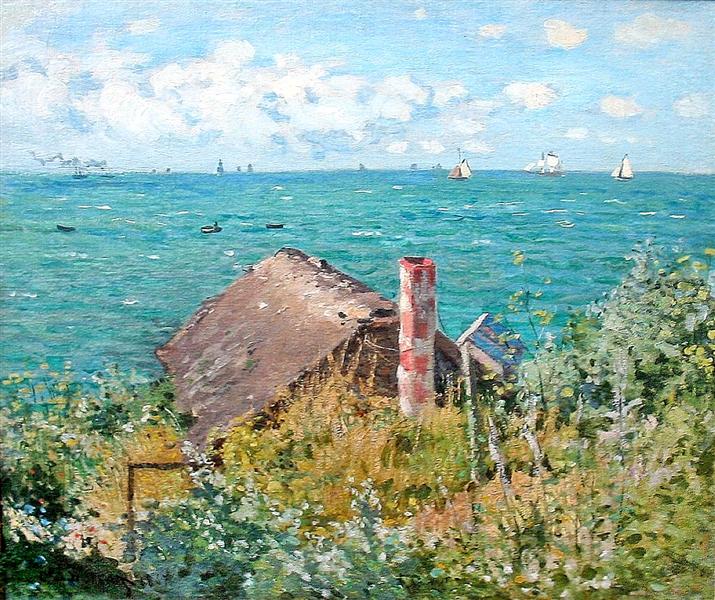Description
Claude Monet's 1867 painting "La Cabane de Saint-Adresse" stands out as a paradigmatic example of the visual alchemy that the painter achieved in his early years, just before establishing himself as one of the founders of the Impressionist movement. This painting not only captures the essence of a moment on the French coast, but also reflects the ingenious use of color and light that would characterize all of Monet's later work.
Set in a coastal landscape that portrays his own experience at the seaside resort of Saint-Adresse, the work features a simple cottage in the foreground, which becomes the visual focus of the composition. Monet seems to place the viewer in a position of closeness, almost intimacy, with the scene. The cottage, with its warm-coloured façade, is a symbol of rest and an invitation to contemplation, while the background takes on a bluer, more vaporous tone, reflecting the sky and the sea and a sign of the serenely bohemian atmosphere that prevailed at the time.
The dynamism of the work is accentuated through the arrangement of the elements. The sea breeze is manifested through the movement of the waves and surrounding vegetation, lending an almost painterly quality to the ephemeral. The use of long, loose brushstrokes is characteristic of Monet and anticipates the approach of Impressionism, which sought to capture the variations of time and light at a given moment. The rich, vibrant colour palette shares the warmth of the sunset with the blue hues of the sea, creating a harmony that is deeply satisfying.
In the work, human figures appear to be enjoying the summer surroundings, although they are not the main focus of the painting. These small silhouettes, working in an almost decorative sense, add life to the scene, suggesting a narrative of leisure and enjoyment on a summer day. This inclusion allows Monet to explore the interaction between nature and man, a recurring theme in his series of works, where the natural environment is not simply a backdrop, but an active participant.
Monet, at this period of his career, was influenced by both the Romantic landscape tradition and the search for a more contemporary and vibrant depiction of reality. The Cottage at Saint-Adresse can be seen as a cross between those styles, showing a transition towards a more modern approach. The work was not exhibited at the Paris Salon and, due to a lack of immediate recognition, was largely forgotten until its rediscovery in the 20th century.
This painting, while anchored in a particular moment in the artist’s life, resonates with the eternal search for beauty in the everyday, a theme that Monet would pursue throughout his career. Thus, “The Cottage at Saint-Adresse,” through its light, color, and freshness, continues to invite the viewer to immerse themselves in an instant of harmony and reflection. The work is not only a window into a specific moment in time, but also an expression of the spirit of Impressionist art that Monet would help define.
KUADROS ©, a famous painting on your wall.
Hand-made oil painting reproductions, with the quality of professional artists and the distinctive seal of KUADROS ©.
Painting reproduction service with satisfaction guarantee. If you are not completely satisfied with the replica of your painting, we will refund 100% of your money.

